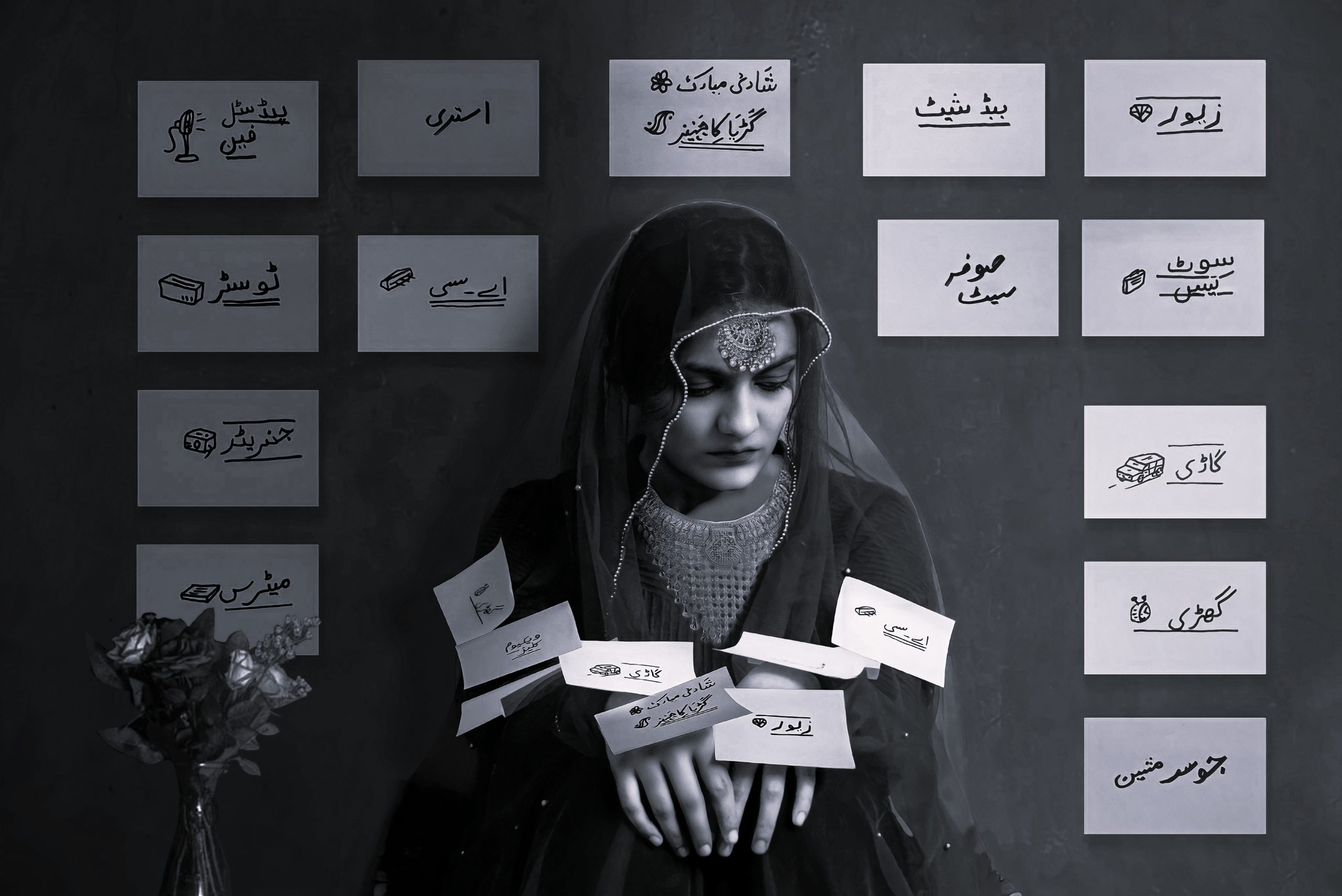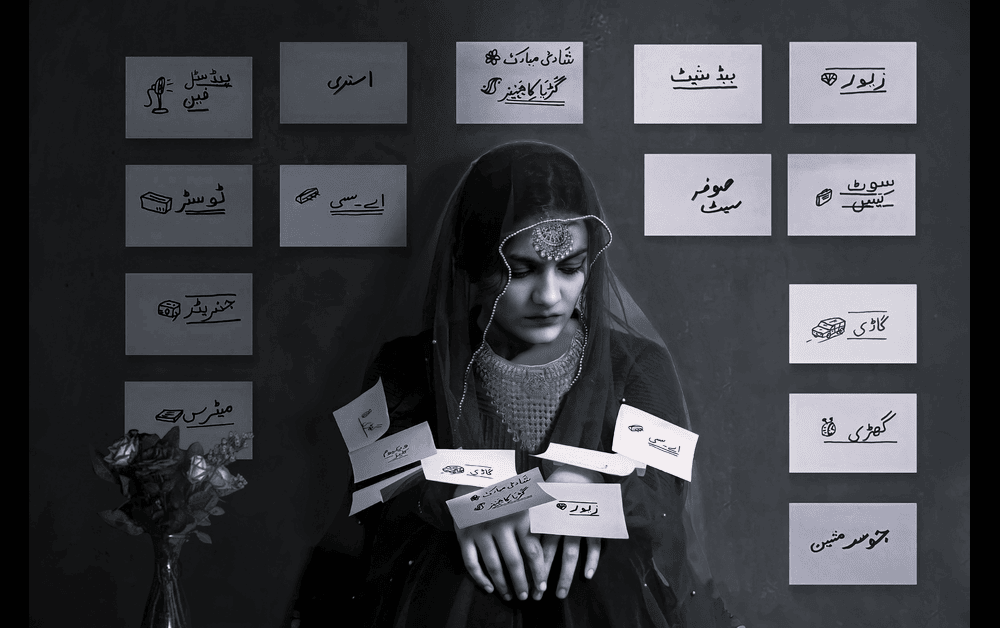
In South Asia, a bride isn’t just a person — she’s a package deal. A doll in a box, complete with furniture, jewelry, appliances, and a car. And the more ‘extras’ she brings, the more she’s valued. Disgusting, isn’t it?
Dowry is a social evil. It’s an age-old practice that has plagued South Asian societies for centuries, and yet, somehow, we still act like it’s normal. Let’s get real.
Dowry is essentially the assets a bride’s family is expected to give to the groom and his family. It could be clothes, jewelry, crockery, furniture, cars, property, you name it. Once meant as voluntary gifts, dowry has now morphed into one of the ugliest forms of financial and emotional blackmail.
Some horrifying facts to consider:
- In 2022, the National Crime Records Bureau (NCRB), India, recorded 6,589 dowry deaths. That’s 18 women every single day dying due to dowry-related violence. India also registers over 10,000 cases of cruelty by husbands and in-laws annually related to dowry demands.
- In Pakistan, rough estimates suggest around 2,000 women are killed each year in dowry-related violence. Many cases go unreported because of family and police pressure.
- A UN Women report highlighted that dowry demands are a major cause of domestic violence in Pakistan.
- A 2019 report by the Bangladesh Bureau of Statistics found over 50% of women had faced dowry-related abuse at some point in their lives. Dowry-related deaths number in the hundreds annually, with acid attacks and bride burning still reported.
Let’s talk about the excuses:
Some say dowry gives the bride importance in her in-laws’ eyes, that it safeguards her marriage, or ensures she has a voice in decision-making. Sounds ridiculous, right? It is. Why would anyone want to be in a marriage where her respect depends on the price tag of her belongings?
Others argue that dowry is just “practical gifts” to help the couple start life together, a bed, sofas, a fridge, car. But here’s the hard truth: a marriage where a husband needs a bed, a set of plates, or a car from his in-laws isn’t a partnership, it’s a transaction. A union of two adults shouldn’t be based on who bought what.
And let’s not sugarcoat it, the groom’s family asking for dowry is almost always about greed. They are treating marriage like a marketplace where women are dolls to be purchased, each doll “better” depending on how many accessories come with her. The corruption, the obsession with money, the commodification of human relationships, it’s disgusting.
Dowry perpetuates fear. Fear of having a daughter. Fear of having an “unmarriageable” daughter. Fear of divorce. Fear of social shaming. It contributes directly to the “missing women” phenomenon (millions of girls not born due to son preference). It contributes to families left in debt and thousands of brides abused and abandoned. It’s a cycle that must end.
I speak from experience: when I got married, there was no dowry. My husband refused it point blank. No bribes disguised as “love.” And guess what? Our marriage didn’t crumble because we didn’t get a fridge or sofa set from my parents. We built our own life together as equals — like adults should.
We are living in a time and at a stage where we should shame anyone who dares to hint at dowry. If someone comes to your home and even thinks about asking, show them the door. Don’t be polite. Don’t listen. Don’t give in. By tolerating these demands, you’re feeding a system that leads to violence, abuse, and death.
We call ourselves people of honor, faith, and family values, yet we sell our daughters like merchandise. We talk about love, but treat marriage like a business deal. We pray for blessings, then chase greed.
Dowry is not a tradition — it’s a hypocrisy we’ve normalized. And it’s time we burn it to the ground. Start in your family. Stand firm. Teach your children that marriage is not a transaction, and women are not commodities.
A woman’s worth will never fit inside a suitcase, on a receipt, or in a bank account. The only thing she brings to a marriage is herself — and that is priceless.
جہیز: ایک سماجی لعنت
جنوبی ایشیا میں دلہن صرف ایک انسان نہیں سمجھی جاتی — بلکہ ایک پیکیج ڈیل سمجھی جاتی ہے۔ ایک گڑیا ڈبّے میں، ساتھ فرنیچر، زیورات، برتن، گاڑی اور گھریلو سامان۔ اور جتنے زیادہ یہ “ایکسٹراز” ہوں، اُتنی زیادہ اُس کی عزت سمجھی جاتی ہے۔ گھِن نہیں آتی؟
جہیز ایک سماجی لعنت ہے۔ صدیوں سے یہ رواج ہمارے معاشروں کو کھا رہا ہے، اور آج بھی ہم ایسے جی رہے ہیں جیسے یہ کوئی معمولی بات ہو۔ اب بس بہت ہوگیا۔
جہیز وہ چیزیں ہیں جو دلہن کے گھر والے دلہے اور اُس کے خاندان کو دینے پر مجبور کیے جاتے ہیں۔ کپڑے، زیورات، برتن، فرنیچر، گاڑیاں، جائیداد — سب کچھ۔ جو کبھی تحفہ سمجھا جاتا تھا، آج وہ مالی اور جذباتی بلیک میلنگ کی بدترین شکل بن چکا ہے۔
:کچھ خوفناک حقائق
بھارت کے نیشنل کرائم ریکارڈ بیورو کے مطابق، 2022 میں 6,589 جہیز کے کیسز میں عورتیں مار دی گئیں۔ یعنی ہر دن 18 عورتیں جہیز کی وجہ سے اپنی جان سے ہاتھ دھو بیٹھتی ہیں۔
پاکستان میں اندازاً ہر سال 2,000 عورتیں جہیز کے جھگڑوں میں قتل کر دی جاتی ہیں۔ زیادہ تر واقعات رپورٹ بھی نہیں ہوتے۔
یو این ویمن کی ایک رپورٹ کے مطابق پاکستان میں گھریلو تشدد کی بڑی وجہ جہیز ہے۔
بنگلادیش کے بیورو آف اسٹیٹسٹکس کی 2019 کی رپورٹ میں بتایا گیا کہ 50 فیصد سے زیادہ عورتوں نے جہیز کی وجہ سے کسی نہ کسی ظلم کا سامنا کیا۔ ہر سال درجنوں عورتیں جلائی جاتی ہیں، تیزاب پھینکا جاتا ہے اور قتل تک کر دی جاتی ہیں۔
:اب ذرا اُن بہانوں پر بھی بات کرلیں
کچھ لوگ کہتے ہیں جہیز سے دلہن کی عزت بڑھتی ہے، یا شادی مضبوط ہوتی ہے، یا گھر میں اُس کی آواز بن جاتی ہے۔ مذاق لگتا ہے، ہے نا؟ کیونکہ یہ بالکل ہی فضول ہے۔ کون سا انسان اپنی عزت کا دارومدار صوفے اور برتنوں پر رکھے گا؟
کچھ کہتے ہیں جہیز تو بس “پریکٹیکل تحفے” ہیں تاکہ نیا جوڑا زندگی شروع کر سکے۔ بیڈ، صوفہ، فریج، کار وغیرہ۔ مگر سچ یہ ہے کہ اگر شوہر کو اپنے بیڈ یا پلیٹیں اپنی بیوی کے باپ سے لینی پڑیں تو یہ شادی نہیں، سودا ہے۔ شادی دو بالغ انسانوں کی شراکت ہے، نہ کہ خرید و فروخت۔
اور حقیقت یہ ہے کہ دلہے کے خاندان کا جہیز مانگنا صرف اور صرف لالچ ہے۔ سیدھی سی بات۔ شادی کو مارکیٹ بنا دیا گیا ہے، جہاں لڑکیاں گڑیائیں ہیں اور اُن کی قیمت اُن کے ساتھ آنے والے “ایکسٹراز” سے لگائی جاتی ہے۔ رشتوں کو پیسے اور لالچ کے ترازو میں تولنا — یہ گندگی کے سوا کچھ نہیں۔
جہیز خوف پیدا کرتا ہے۔ بیٹی پیدا ہونے کا خوف۔ “شادی کے قابل نہ ہونے” کا خوف۔ طلاق کا خوف۔ بدنامی کا خوف۔ یہ ڈر والدین کو قرضوں میں ڈبو دیتا ہے، لڑکیوں کو ظلم سہنے پر مجبور کرتا ہے اور معاشرے میں بیٹی کو بوجھ سمجھنے کی سوچ کو بڑھاتا ہے۔ یہ سلسلہ ختم ہونا چاہیے۔
میں اپنی مثال دیتی ہوں: جب میری شادی ہوئی، کوئی جہیز نہیں تھا۔ میرے شوہر نے صاف انکار کر دیا۔ نہ کوئی رشوت جو “محبت” کے نام پر لپیٹ کر دی گئی ہو۔ اور سچ بتاؤں؟ ہماری شادی فریج یا صوفے کے بغیر بھی نہیں ٹوٹی۔ ہم نے اپنی زندگی خود بنائی، برابری کے ساتھ — جیسے بالغ انسان کرتے ہیں۔
آج کے دور میں اگر کوئی آپ کے گھر آکر جہیز کا اشارہ بھی کرے، تو اُسے سیدھا دروازہ دکھائیں۔ نہ لحاظ کریں، نہ سنیں، نہ مانیں۔ کیونکہ آپ کا ہلکا سا سمجھوتہ بھی اُن ہزاروں ظلموں، قتلوں اور خودکشیوں کو بڑھاتا ہے جو جہیز کی وجہ سے روز ہوتے ہیں۔
ہم خود کو عزت دار، دیندار اور فیملی ویلیوز والے لوگ کہتے ہیں، مگر اپنی بیٹیوں کو مال کی طرح بیچتے ہیں۔ ہم محبت کی بات کرتے ہیں، مگر شادی کو بزنس ڈیل بنا دیتے ہیں۔ ہم دعائیں مانگتے ہیں، اور پھر لالچ کے پیچھے بھاگتے ہیں۔
جہیز کوئی روایت نہیں — یہ ایک منافقت ہے جسے ہم نے معمول بنا لیا ہے۔ اور وقت آگیا ہے کہ اسے جلا کر ختم کر دیں۔ اپنے گھروں سے آغاز کریں۔ ڈٹ جائیں۔ اپنی اولاد کو سکھائیں کہ شادی لین دین نہیں، اور عورت کوئی سامان نہیں۔
عورت کی قیمت کبھی کسی سوٹ کیس میں، رسید پر یا بینک اکاؤنٹ میں نہیں آ سکتی۔ وہ شادی میں صرف اپنے آپ کو لے کر آتی ہے — اور وہ سب سے قیمتی ہے۔


Leave a Reply